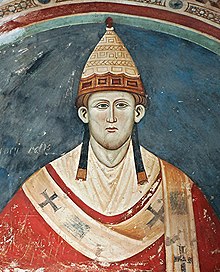
Back Pous Innocentius III Afrikaans Inocencio III AN إينوسنت الثالث Arabic اينوسنت التالت ARZ Inocenciu III AST III İnnokenti Azerbaijani Інакенцій III Byelorussian Інакенцыюс III (папа рымскі) BE-X-OLD Инокентий III Bulgarian Inosant III Breton
Innocent III | |||||||||||||||||||||||||||||||||||||||||
|---|---|---|---|---|---|---|---|---|---|---|---|---|---|---|---|---|---|---|---|---|---|---|---|---|---|---|---|---|---|---|---|---|---|---|---|---|---|---|---|---|---|
| Bishop of Rome | |||||||||||||||||||||||||||||||||||||||||
 Detail of a fresco at the cloister Sacro Speco, c. 1219 | |||||||||||||||||||||||||||||||||||||||||
| Church | Catholic Church | ||||||||||||||||||||||||||||||||||||||||
| Papacy began | 8 January 1198 | ||||||||||||||||||||||||||||||||||||||||
| Papacy ended | 16 July 1216 | ||||||||||||||||||||||||||||||||||||||||
| Predecessor | Celestine III | ||||||||||||||||||||||||||||||||||||||||
| Successor | Honorius III | ||||||||||||||||||||||||||||||||||||||||
| Previous post(s) |
| ||||||||||||||||||||||||||||||||||||||||
| Orders | |||||||||||||||||||||||||||||||||||||||||
| Ordination | 21 February 1198 | ||||||||||||||||||||||||||||||||||||||||
| Consecration | 22 February 1198 by Ottaviano di Paoli | ||||||||||||||||||||||||||||||||||||||||
| Created cardinal | September 1190 by Clement III | ||||||||||||||||||||||||||||||||||||||||
| Personal details | |||||||||||||||||||||||||||||||||||||||||
| Born | Lotario de' Conti di Segni 22 February 1161 Gavignano, Papal States | ||||||||||||||||||||||||||||||||||||||||
| Died | 16 July 1216 (aged 55) Perugia, Papal States | ||||||||||||||||||||||||||||||||||||||||
| Nationality | Italian | ||||||||||||||||||||||||||||||||||||||||
| Parents | Count Trasimund of Segni and Claricia Scotti | ||||||||||||||||||||||||||||||||||||||||
| Coat of arms |  | ||||||||||||||||||||||||||||||||||||||||
Ordination history | |||||||||||||||||||||||||||||||||||||||||
| |||||||||||||||||||||||||||||||||||||||||
| |||||||||||||||||||||||||||||||||||||||||
| Other popes named Innocent | |||||||||||||||||||||||||||||||||||||||||
Pope Innocent III (Latin: Innocentius III; 22 February 1161 – 16 July 1216),[1] born Lotario dei Conti di Segni (anglicized as Lothar of Segni), was the head of the Catholic Church and ruler of the Papal States from 8 January 1198 until his death on 16 July 1216.
Pope Innocent was one of the most powerful and influential of the medieval popes. He exerted a wide influence over the Christian states of Europe, claiming supremacy over all of Europe's kings. He was central in supporting the Catholic Church's reforms of ecclesiastical affairs through his decretals and the Fourth Lateran Council. This resulted in a considerable refinement of Western canon law. He is furthermore notable for using interdict and other censures to compel princes to obey his decisions, although these measures were not uniformly successful.
Innocent greatly extended the scope of the Crusades, directing crusades against Muslim Iberia and the Holy Land as well as the Albigensian Crusade against the Cathars in southern France. He organized the Fourth Crusade of 1202–1204, which ended in the sack of Constantinople. Although the attack on Constantinople went against his explicit orders, and the Crusaders were subsequently excommunicated, Innocent reluctantly accepted this result, seeing it as the will of God to reunite the Latin and Eastern Orthodox Churches. In the event, the sack of Constantinople and the subsequent period of Frankokratia heightened the hostility between the Latin and Greek churches; the Byzantine Empire was restored in 1261, albeit in a much weaker state.[2]
- ^ "Pope Innocent III (Lotario dei conti di Segni) [Catholic-Hierarchy]". www.catholic-hierarchy.org. Retrieved 6 January 2021.
- ^ Moore 2003, pp. 102–134.